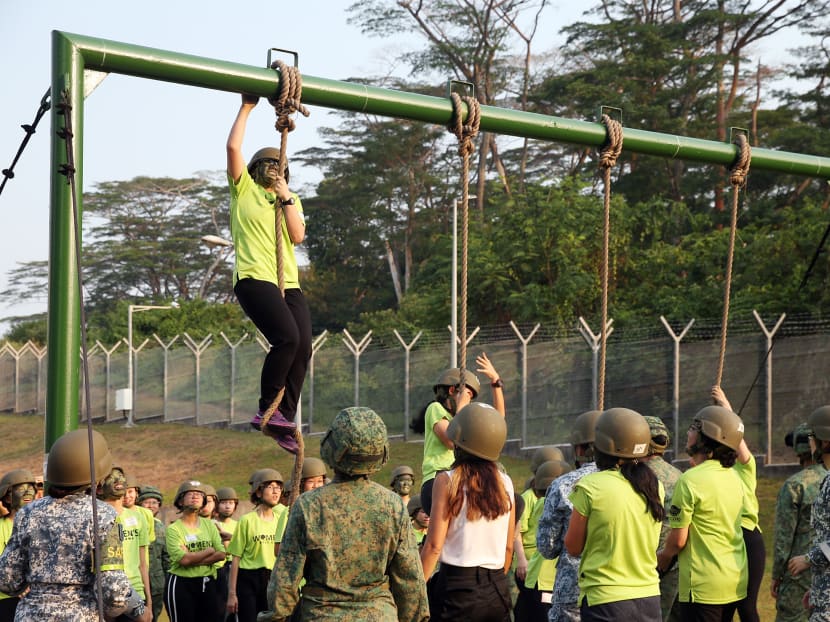Societal costs of mandatory NS enlistment for women far outweigh benefits: Ng Eng Hen
SINGAPORE — There are "inadequate justifications" for enlisting women into National Service (NS), as the societal cost far outweighs the benefits of doing so, said Minister of Defence Ng Eng Hen on Monday (May 9).

- The societal costs of enlisting women into National Service would outweigh the benefits, said Defence Minister Ng Eng Hen
- Should women go through mandatory enlistment, it may make manpower shortages in other industries worse, he added
- There will also be a decline in the size of the local workforce and a reduction in household incomes
- Such cost is unjustified in "sending a signal" or to reverse gender stereotypes, he said
SINGAPORE — There are "inadequate justifications" for enlisting women into National Service (NS), as the societal cost far outweighs the benefits of doing so, said Minister of Defence Ng Eng Hen on Monday (May 9).
But Dr Ng added that should Singapore ever face "an existential threat by an aggressor", he is certain that the Ministry of Defence (Mindef) and the Singapore Armed Forces (SAF) will call on the Government of the day to enlist not only women, but also teenagers and older men to defend Singapore.
Dr Ng was speaking in Parliament, responding to questions posed by Member of Parliament (MP) for Sembawang Group Representation Constituency (GRC) Poh Li San and MP for Nee Soon GRC Carrie Tan regarding the enlistment of women into NS and the roles of SAF servicewomen and those in senior leadership.
On the issue of enlisting women, Ms Tan had asked if there are any other considerations apart from having an adequate NS population to meet the Republic's national security and defence needs and if so, what are these considerations.
In his reply, Dr Ng said that the societal costs of enlisting women into national service would outweigh the benefits.
Women would be delayed entry into the workforce, and this would result in an "accentuated decline" in the size of the local workforce and a reduction in household incomes.
"Even if women are enlisted for non-military National Service roles to augment our healthcare and social services, it may make manpower shortages in other industries worse," Dr Ng said. "Over the long term, it will impose a great cost not only on women themselves, but also on the families, children and spouses and society as a whole."
"Is that cost justified to send a signal, or to reverse stereotypes? From the Government's perspective, no," he added. "I think most Singaporeans will say no, too, from a security perspective."
Dr Ng added that there are "distinct pitfalls" if conscription, of either men or women, is implemented for any other reason than the critical need for military defence.
"The primary reason for enlistment today into the SAF must remain to train a soldier who's able to defend Singapore to repel, if not defeat, an enemy who wants to invade our country," said Dr Ng. "Likewise, enlistment into the police and SCDF (Singapore Civil Defence Force) must be based on the national need for homeland security and emergency services.
Dr Ng added that the "stark raison d'être" of National Service is to fight and defend Singapore, and ensure its security is the "foremost consideration that must undergird the mandatory enlistment of all national servicemen".
"It's very far off from the proposals to conscript women to serve in roles such as caregivers and healthcare workers, or to send a powerful signal of gender equality," he said. "These are inadequate justifications or reasons to mandate that someone must suspend individual liberties as a civilian and give up two years of his or her life."
Dr Ng's response comes after the Government presented a White Paper on women's development in Parliament in March, to move Singapore towards a a fairer and more inclusive society for men and women in workplaces and at home.
Dr Ng added, however, that should there be an "existential threat by an aggressor" leading to a "sudden and great need to boost our military", he is certain that the Government will be called to enlist not only women, but also teenagers and elderly men.
He used the example of the recent Russian invasion of Ukraine.
"When (Ukraine) was invaded, they required women employed in a wide range of professions aged between 18 and 60 years to register for possible military conscription," he said.
"Young men and elderly who will pass their retirement age also volunteered to fight on the frontlines to protect the country.
"But we are not there today, and hope never to be."
Ms Poh, who was formerly a helicopter pilot in the Republic of Singapore Air Force, had also asked what the current proportion of servicewomen in the SAF is, and what measures will be taken to increase the proportion of SAF servicewomen, especially those in senior leadership roles.
Dr Ng said that the "significant contributions" women already make to Singapore's national defence should not be dismissed or downplayed.
He said that there are regular servicewomen currently serving in vocations and roles such as infantry, artillery, armour, combat engineers, pilots and naval officers.
"Today, we have more than 1,600 uniformed servicewomen in the SAF who make up about 8 per cent of our regulars," he said. "In addition, more than 500 women have been trained and deployed as SAF volunteers in a variety of roles since 2015."
He added that women make up 5 per cent of regulars holding senior ranks of Lieutenant Colonel Military Expert 6, or master Warrant Officer.
"We hope to see this figure increase in proportion (as the number of) servicewomen in the SAF continues to grow."
Response by MPs and Aware
In response to TODAY's queries, Ms Tan said that her question was intended to go beyond the traditional notions of military defence highlighted by Dr Ng.
"If NS is about protecting citizens from threats, we need to expand our view to see threats emerging internally.
"Total Defence looks at psychological and social defence, which calls on us to protect the well-being of our citizens from these perspectives. The current generation is under siege from too much stress and care burdens from an aging society.
"The mental wellness of our people is an important thing to protect, and alleviating stress and care burdens is one way we can defend our our people’s social and psychological well-being."
In a Facebook post on Monday, she said that her suggestion for women to be enlisted for NS in roles beyond the military was "not driven by a simplistic 'ideal' of equality between men and women', but to meet national caregiving needs in face of Singapore's ageing population by expanding "the definition of NS to include care vocations".
"Including women in NS and deploying young people in military or care positions depending on the individual's physical aptitude would make us stronger as a nation. It would allow us to address two of this nation's challenges at the same time — caregiving and defence," she wrote.
This was also a point made by Ms Corinna Lim, executive director of the Association of Women for Action and Research (Aware), a gender advocacy group, in response to TODAY's queries.
Ms Lim said that Aware agrees with Dr Ng that conscription should only be deployed when absolutely necessary for the survival of the nation.
"In principle, we do not support conscription for anyone, no matter their gender," said Ms Lim, who had in a public lecture last year renewed Aware's calls for the authorities to expand NS to include other roles that can also be opened to women.
On Monday, Ms Lim said this was borne out of the practical need for more participation in increasingly urgent areas such eldercare, climate change and others.
"That gender-neutral NS might consequently help to tamper manifestations of sexism such as the gender pay gap — often justified by the reasoning that men deserve higher pay to make up for NS — is an important bonus," she said.
"We agree with Dr Ng that the incautious introduction of NS for women today would likely have negative consequences on women, such as in their careers and finances," she added, noting that women already bear the brunt of unpaid labour in the form of domestic and caregiving responsibilities.
"The last thing we want to do is impose yet another responsibility for which they don't receive satisfactory compensation. Any initiatives to make NS gender-neutral must come hand-in-hand, and indeed cede priority to, other efforts to remove gender-based barriers that keep women from decent work and commensurate pay."
When asked about her comments on Dr Ng's response, Ms Poh told TODAY that with dwindling birth rates and fewer male conscripts in the future, it is important to increase the proportion of professional servicewomen in the SAF.
In turn, there should also be "correspondingly more servicewomen in senior leadership", she said.
She said: "I’m heartened to know that SAF wants to attract more women to join, beyond the 8 per cent representation today.
"I think SAF needs to make a significant concerted effort to push that proportion up, to attract women who are interested in a military career, retain them and ensure a consistent pipeline of senior women leadership as a testament that servicewomen can also excel in the SAF.
"(The) provision of some flexible work arrangements are also important to allow servicewomen time to start and raise young families."
She added that in other small countries such as New Zealand, servicewomen can make up to 15 per cent of its armed forces and that "if SAF can increase to a similar proportion of servicewomen, that would help to meet our defence human resource needs".













